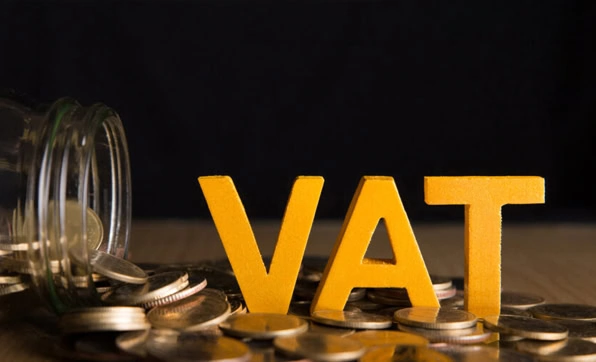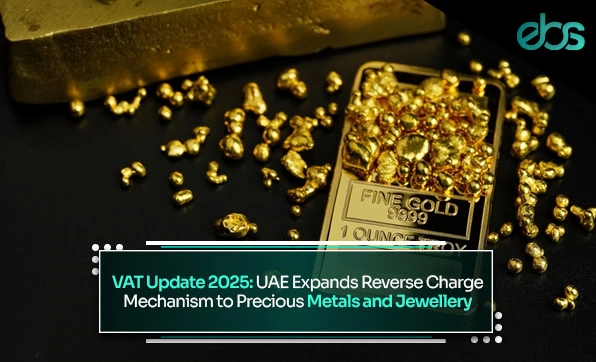The United Arab Emirates (UAE) has lately made important adjustments to its Value Added Tax (VAT) policies, especially regarding the trade of precious metals, stones, and jewelry. On January 11, 2025, the UAE Ministry of Finance introduced the growth of the reverse charge mechanism through Cabinet Decision No. (127) of 2024. This decision replaces the preceding Cabinet Decision No. (25) of 2018, which mostly focused on gold and diamonds amongst VAT-registered dealers.

Overview of the New VAT Regulations
Under the up-to-date provisions, VAT-registered companies that deliver precious metals—which includes gold, silver, palladium, and platinum—in conjunction with precious metals, together with diamonds (both natural and synthetic), pearls, rubies, sapphires, and emeralds, are now no longer required to charge VAT to other VAT-registered customers. Instead, the obligation for calculating and reporting VAT is now shifted to the client of their tax returns. This change is designed to simplify VAT compliance and decrease administrative burdens for companies working in this zone.
Key Features of the Reverse Charge Mechanism
The reverse charge mechanism lets in VAT-registered customers to address their very own VAT calculations and reporting in place of counting on dealers to control this aspect. This shift now no longer simply streamlines procedures; it also complements cash flow for companies engaged in buying and selling precious metals and stones. The Ministry of Finance highlighted that those adjustments are a part of a broader initiative to create a greater commercial enterprise-pleasant environment that aligns with worldwide excellent practices.
Materials Covered:
- Precious Metals: Gold, silver, palladium, platinum
- Precious Stones: Natural and synthetic diamonds, pearls, rubies, sapphires, and emeralds
- Jewelry: Items crafted from those substances in which their cost exceeds that of different components.
Benefits for the Trading Sector
The growth of the reverse charge mechanism is anticipated to yield numerous benefits for the UAE’s buying and selling zone:
- Reduced Administrative Workload: Businesses can pay greater attention to their center operations without the load of gathering and remitting VAT.
- Streamlined Compliance Procedures: The new policies simplify tax reporting procedures for buyers.
- Enhanced Competitiveness: By assuaging coins glide pressures and decreasing compliance costs, the UAE strengthens its role as an international hub for treasured metals and stones trading.
These regulatory updates mirror the UAE government’s dedication to fostering an increase within the buying and selling zone while making sure that its policies stay competitive on a global scale.
Strategic Implications
The decision to implement those adjustments underscores the UAE’s willpower to financial diversification and competitiveness. By growing a greater favorable regulatory framework for treasured metals and stones buying and selling, the UAE targets to draw greater buyers and buyers to its markets. This flow is likewise aligned with worldwide requirements and excellent practices in VAT administration.
The Ministry of Finance emphasized that those modifications aren’t simply administrative; they constitute a strategic shift aimed toward improving ordinary commercial enterprise performance in the zone. The government’s ongoing efforts to aid a thriving buying and selling environment are obtrusive on this cutting-edge replacement to VAT regulations.
Conclusion
In summary, the expansion of the reverse charge mechanism for precious metals, stones, and jewelry represents a significant improvement within the UAE’s VAT landscape. By shifting VAT obligations from sellers to buyers, those new policies aim to simplify compliance procedures even as boosting competitiveness in an important zone of the economy. As the UAE maintains its alignment with international excellent practices, it reaffirms its role as a main hub for precious metals buying and selling within the region. This proactive method not only supports local companies but additionally draws worldwide players trying to have interaction in this rewarding market. A VAT consultant in Dubai performs an important function in assisting companies in navigating and observing VAT policies, making sure of correct tax reporting, minimizing liabilities, and fending off consequences through professional steering and aid.
FAQs:
What is the reverse charge mechanism?
It’s a VAT system where the buyer, not the seller, is responsible for calculating and paying VAT.
Which businesses are affected by this change?
VAT-registered businesses dealing with precious metals, stones, and jewelry.
Do sellers still collect VAT from buyers?
No, sellers no longer collect VAT from VAT-registered customers in this sector.
What must buyers do under this update?
Buyers must calculate, declare, and report VAT on their tax returns.

